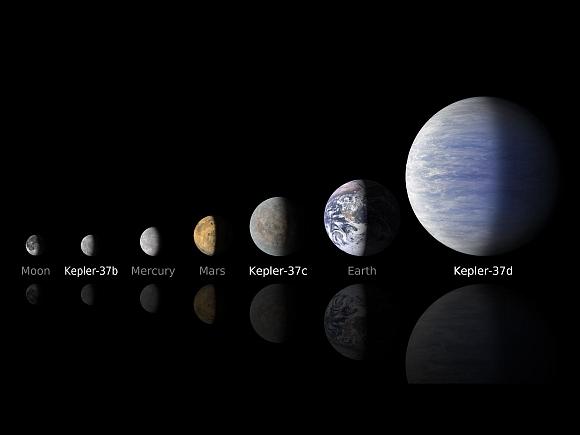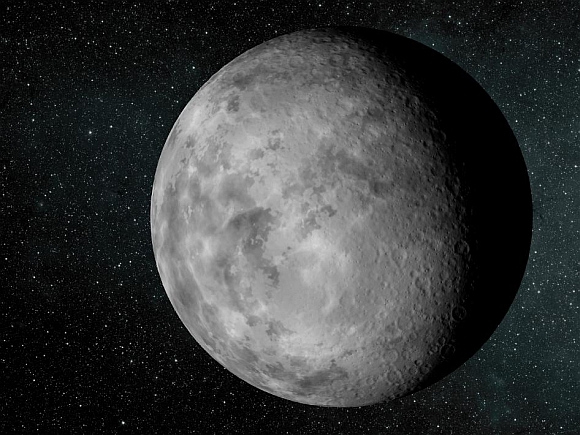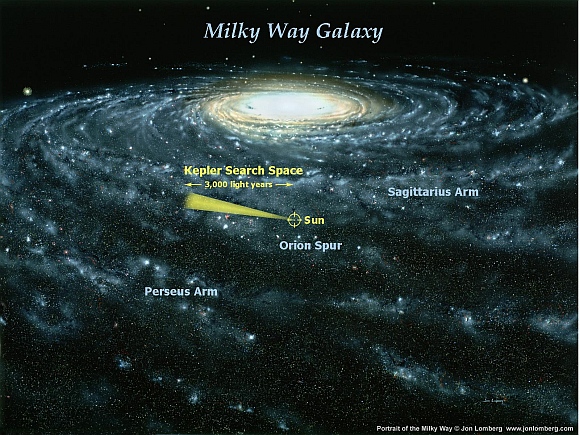 | « Back to article | Print this article |
NASA's newly discovered planet is tiniest to date
The National Aeronautics and Space Administration has discovered the smallest known planet outside our solar system which is slightly larger than the moon and orbits its sun like host star every 13 days.
NASA's Kepler space telescope detected the smallest planet yet found around a star similar to the Sun in a new planetary system.
The planets are located in a system called Kepler-37, about 210 light-years from earth in the constellation Lyra. The smallest planet, Kepler-37b, is slightly larger than our moon, measuring about one-third the size of earth.
It is smaller than Mercury, which made its detection a challenge.
Click NEXT to read further...
PICS: NASA's newly discovered planet is tiniest to date
The moon-size planet and its two companion planets were found by scientists with NASA's Kepler mission to find Earth-sized planets in or near the 'habitable zone', the region in a planetary system where liquid water might exist on the surface of an orbiting planet.
However, while the star in Kepler-37 may be similar to our sun, the system appears quite unlike the solar system in which we live.
Astronomers think Kepler-37b does not have an atmosphere and cannot support life as we know it. The tiny planet almost certainly is rocky in composition.
The Kepler-37c, the closer neighbouring planet, is slightly smaller than Venus, measuring almost three-quarters the size of earth. Kepler-37d, the farther planet, is twice the size of the earth.
Click NEXT to read further...
PICS: NASA's newly discovered planet is tiniest to date
"Even Kepler can only detect such a tiny world around the brightest stars it observes," said Jack Lissauer, a planetary scientist at NASA's Ames Research Center in Moffett Field, California.
"The fact we've discovered tiny Kepler-37b suggests such little planets are common, and more planetary wonders await as we continue to gather and analyse additional data," said
Lissauer in a NASA statement.
Kepler-37's host star belongs to the same class as our sun, although it is slightly cooler and smaller. All three planets orbit the star at less than the distance Mercury is to the sun, suggesting they are very hot, inhospitable worlds.
The estimated surface temperature of this smoldering planet, at more than 426.667° C, would be hot enough to melt the zinc in a penny.
Click NEXT to read further...
PICS: NASA's newly discovered planet is tiniest to date
Kepler-37c and Kepler-37d, orbit every 21 days and 40 days, respectively.
"We uncovered a planet smaller than any in our solar system orbiting one of the few stars that is both bright and quiet, where signal detection was possible," said Thomas Barclay, Kepler scientist at the Bay Area Environmental Research Institute in Sonoma, California, and lead author of the new study published in the journal Nature.
"This discovery shows close-in planets can be smaller, as well as much larger, than planets orbiting our sun," he said.
TOP photo features of the week
Click on MORE to see another set of PHOTO features...




